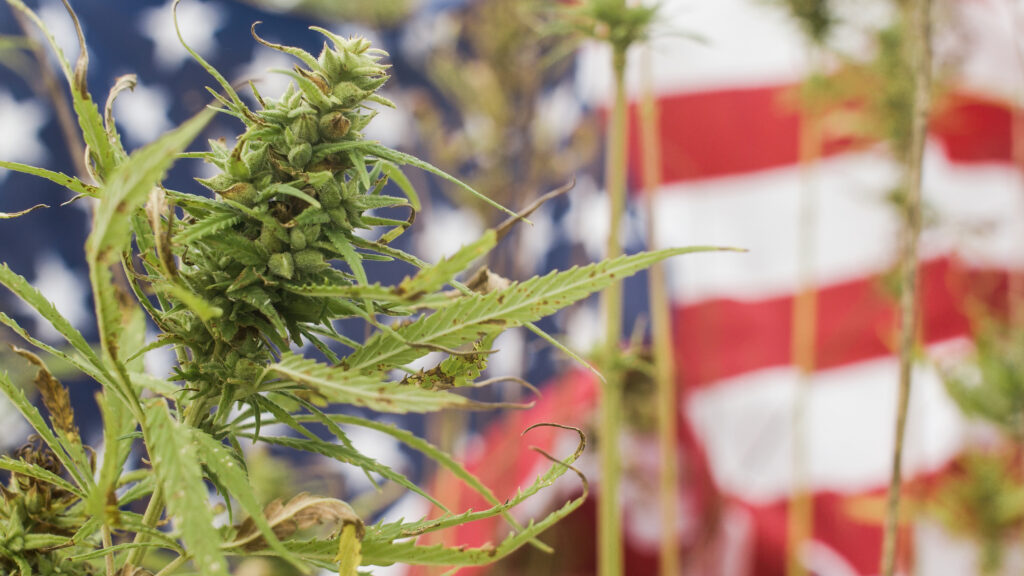A draft bill has been introduced to Congress with the potential to legalize marijuana at the federal level.
The conversation of legalizing marijuana at the federal level is starting once again with the unveiling of Senate Majority Leader Charles E. Schumer’s newest draft bill, the Cannabis Administration and Opportunity Act.
This bill comes following the Pew Research Center’s newest polling showing that 60% of Americans now support legalizing marijuana for medical and recreational use. Fewer than 10% of Americans say weed shouldn’t be legal in any form.
Weed is currently legalized for recreational use in 18 states and for medical use in 37 states. However, marijuana is still illegal at the federal level and classified as a Schedule I drug. The current classification makes cannabis punishable by up to one year in jail and a minimum fine of $1,000 for a first conviction.
The current status of marijuana at the federal level has left producers and retailers facing a wide variety of challenges. Issues with banking, transportation, and taxes are commonplace even in states where cannabis has been legalized.
This isn’t the first time legislation to legalize marijuana at the federal level has been introduced on the Congress floor. In 2019, both the House and Senate saw legislation that would decriminalize cannabis and expunge certain criminal records, among other things. While the legislation passed in the House, it failed to move out of committee in the Senate.
The current bill is partially based on last year’s bill. As reported by the Los Angeles Times, under the current language, the bill would, “remove federal penalties for marijuana, expunge criminal records for nonviolent offenders of federal cannabis laws, earmark funding for restorative justice programs, establish tax rates for cannabis products and formally allow states to decide whether to legalize pot.”
Cannabis advocates believe the bill would help marijuana producers and retailers solve many of their current challenges with banking, transportation, and taxes. As well, while states, where weed is still illegal, would be able to opt to keep their current legislation, they wouldn’t be able to prevalent interstate transportation.
Justin Strekal, political director of the National Organization for the Reform of Marijuana Laws, told the Los Angeles Times, “While it wouldn’t tell Nebraska you have to legalize marijuana, it would say you have to allow marijuana that’s being transported from California to Ohio to be able to pass through on your interstate highway system. That is going to trigger a tectonic shift in thinking.”
Under the bill, the Food and Drug Administration and the Treasury Department’s Alcohol and Tobacco Tax and Trade Bureau would regulate the production, distribution and sale of marijuana.
To help address past injustices caused by the federal marijuana prohibitions, the bill would also establish a new office within the Justice Department to help people convicted of nonviolent marijuana-related violations transition out of incarceration.
Advocates like Strekal are excited by the potential with this bill but hope to see some changes made to the draft. This includes stopping drug testing for federal employees and not taxing medical marijuana purchases.
On the other hand, critics like Kevin Sabet, president of Smart Approaches to Marijuana, are concerned the bill favors people who use cannabis versus those who don’t. They hope the later drafts of the bill will include legislation to limit potency, create advertising restrictions, and put a ban on flavored products that could appeal to children.
If the bill was to pass, new doors would also be opened for researchers and scientists. Due to the current status of marijuana, it is difficult for research to be conducted on both the harm and benefits of the drug. The bill would make funding and access to the product easier.
John Hudak, a senior fellow at the Brookings Institution who researches state and federal marijuana policy, is one of many experts who don’t think the bill will pass. However, Hudak called the bill “a good conversation starter.”
After unveiling the bill, Schumer acknowledged he currently lacks the necessary votes to pass the bill through the Senate. He would need total support from Democratic senators plus the support of 10 Republican senators to get past the filibuster.
If the bill was to pass through the House and Senate, it is unclear if President Biden would sign the legislation into law. He has expressed support for the decriminalization of marijuana but not legalization. At a recent briefing, White House Press Secretary Jen Psaki said “nothing has changed” regarding Biden’s views on cannabis reform.
More information on Rideout Law can be found at: https://www.rideoutlaw.com
To view the article click here
